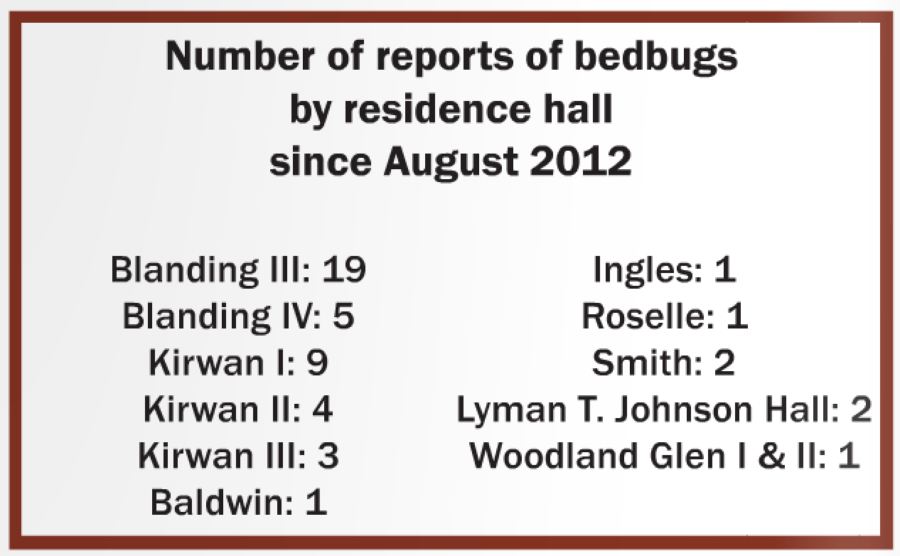Despite bedbug cases in dorms, no need to fear
April 3, 2016
Blood is their only source of food and water, they live where you sleep, and the very mention of their name is enough to give people goosebumps.
In the basement of Agricultural Science Center North, bedbugs wake up for feeding time. UK researchers give them rabbit blood to feast on once a week. The tiny insects, which are visible to the naked eye, but not much bigger at adulthood than a large breadcrumb, respond to heat from blood with noticeable excitement.
When one UK researcher put his thumb over a petri dish, the bugs started scurrying around and congregated where he put his finger, ready to suck his blood — if only he would let them.
Since August 2012, UK residence halls have seen 48 reports of bedbugs but never a full outbreak.
Bedbugs can spread quickly in close-quarter buildings like dorms and should be taken seriously, but extension entomology professor Michael Potter, a world-leading bedbug researcher, said the critters are often misunderstood.
When someone gets bedbugs, they often feel ashamed. They want to keep it a secret because many people think bedbugs only live in dirty, poverty-stricken or cluttered homes.
But this stereotype, among others related to bedbugs, like the false idea that they carry disease, is a misconception.
“The most important thing for students is to take a deep breath,” Potter said. “The key is that these problems are discovered early on so that you can nip them in the bud, so they don’t continue to spread throughout the building.”
Bedbugs can happen to anybody. The insects are professional hitchhikers, and they can sneak into residence halls when people go on Spring Break or visit a friend who has bedbugs.
When cases of bedbugs started popping up in Kentucky around 2003, Potter told UK administrators that they needed to plan ahead: Bedbugs were going to hit campus, and it was just a matter of time.
So they chose OPC Services, a pest control company that operates out of Louisville. UK pays about $114,000 every year for their services, which include bedbug inspections and protection against other creatures like rodents, ants and cockroaches.
For each report of bedbugs in dorm rooms, UK pays $250. OPC is on call 24/7, 365 days a year to respond to bedbug reports.
The university’s private housing partner, EdR, also uses OPC for pest control and handles bedbugs the same way UK does, said Sarah Nikirk, executive director for auxiliary services.
“We take it very seriously,” she said. “We were one of the first in the resident halls business to get on this.”
When students see bedbugs in their dorms and report them, OPC workers do a thorough search of the room and spray insecticides to kill the bugs. They then check adjacent rooms and will sometimes check in with friends who may have recently spent the night in a contaminated room.
OPC’s general manager, Don Partin, said it is important for students to report cases of bedbugs quickly, to check hotel rooms for bedbugs if they travel and to not become embarrassed.
Partin said ticks, among other disease carrying insects, should be of more concern to students than bed bugs, especially because students have a company ready to eliminate the bugs at all hours of the day.
“Normally the (students) brought them in either from home or from spring break,” Partin said. “The university has done a good job of letting kids know that if they see anything, don’t hesitate to call.”
































































































































































